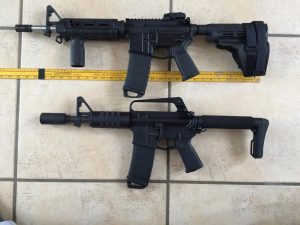A very close friend of mine who is a retired police officer wrote me a very interesting response to our last blog about whether it is lawful to handcuff a licensed gun owner while an officer verifies the validity and authenticity of a gun license. I know this retired officer to be extremely pro Second Amendment and so it was so interesting to hear from an actual police officer who has had to deal with these issues. The two main take-aways are, in my opinion, that there is a complete lack of training (or at least there was back then) on Second Amendment issues and so much of what happens on the street could be remedied if people (including officers) just act nicely and use their words. I know this particular officer and I know that he is not a bully and rather is very good at obtaining compliance with his words. As he points out, if he was a jack a$$, he probably would me in the law books also. I have reprinted his comments below, verbatim except to remove identifying information.
I just read your post about the Connecticut incident. In my rookie year, I was sent to a house on a report of the homeowner mowing his grass while possessing a firearm in an open carry manner. The complaint was the next-door neighbor who had multiple disputes with the subject over the complainant’s dog.
One month prior, the dog got out and almost bit the man who was mowing the grass while he was unloading groceries from his car.
 New York Criminal Attorney Blog
New York Criminal Attorney Blog


